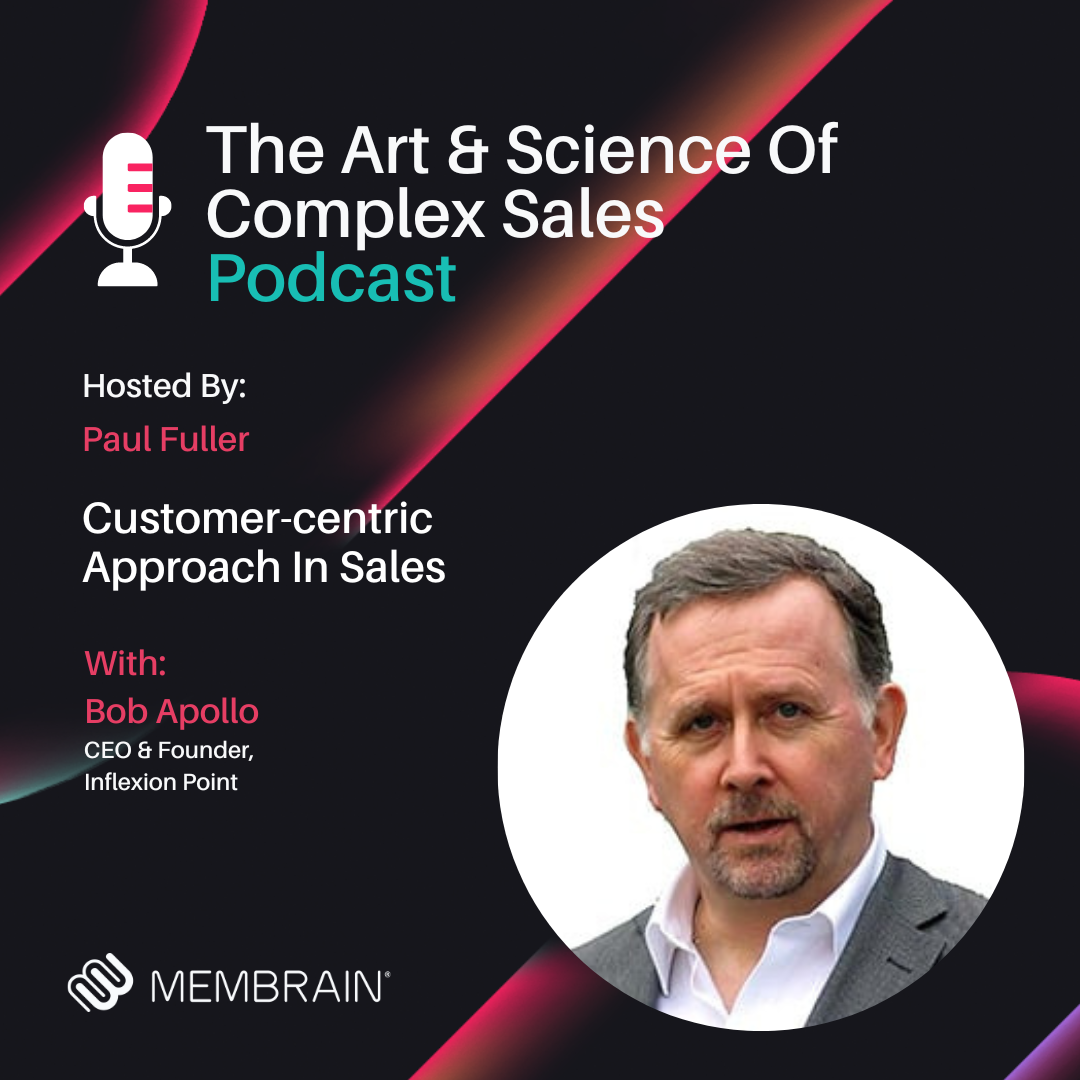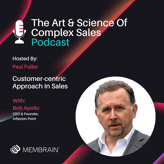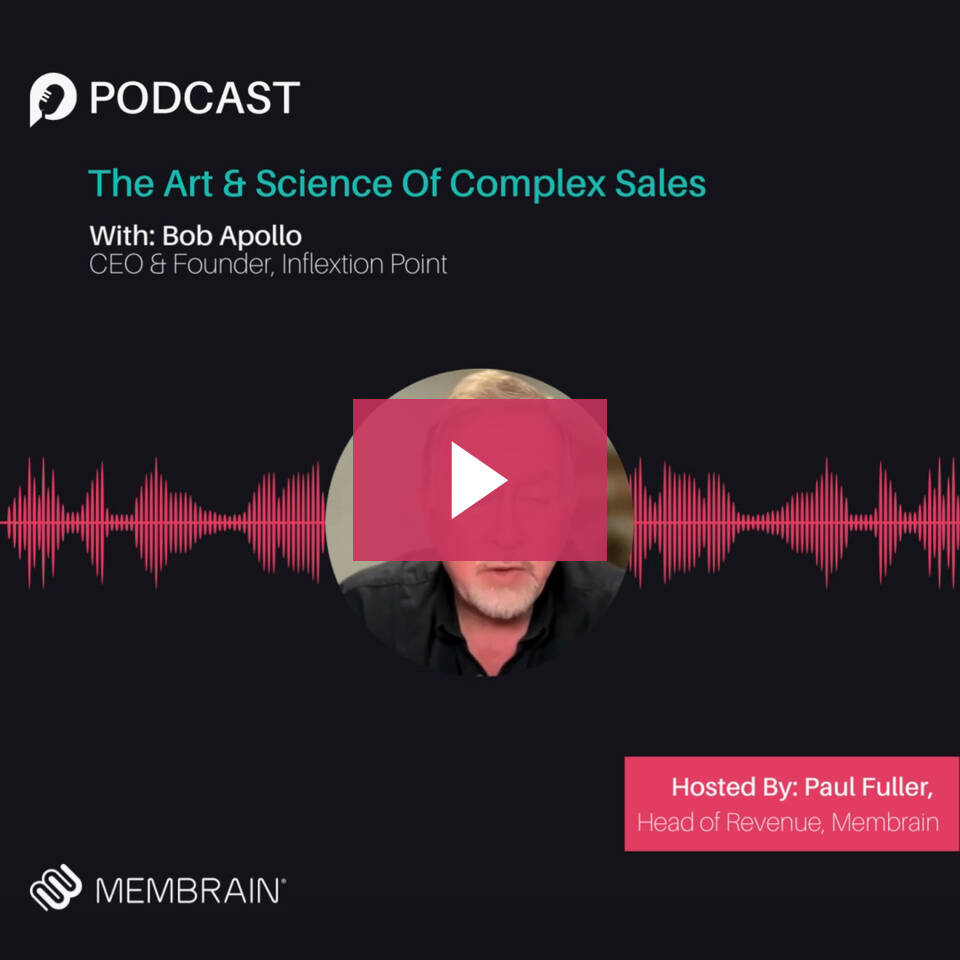Exploring the Art and Science of Complex Sales
May 30, 2023

 I was delighted to be asked to contribute to Membrain’s “The Art & Science of Complex Sales Podcast” with Paul Fuller, and our conversation about taking a Customer-Outcome-Centric approach to B2B sales has just been released.
I was delighted to be asked to contribute to Membrain’s “The Art & Science of Complex Sales Podcast” with Paul Fuller, and our conversation about taking a Customer-Outcome-Centric approach to B2B sales has just been released.
I think you’ll enjoy the conversation, and hopefully find some things that are directly relevant to what you are trying to do in your own organisation. You can listen to the podcast here, but in the meantime, I want to share a few of highlights...
Why we need to focus on outcomes
We started by talking about the characteristics of our most valuable customers. I took the view that this is deceptively simple: it’s basically about identifying and engaging prospective customers who have issues that you are really good at solving, helping them to address those issues, and making sure that the customer gets the outcomes they are looking for.
One of the consequences of this mindset is that our “sales process” doesn’t stop once we’ve taken the order, because we recognise that our customer’s buying journey is never complete until they can look back and agree that their expected outcomes have been agreed.
This in turn implies that we need to understand and wherever possible influence our customer’s desired outcomes from a very early stage in our sales process.
What type of buying journey are they involved in?
We discussed the ludicrous over-simplistic quotes you sometimes hear from researchers along the lines of “every buyer is xx% of the way through their buying journey before they want to engage a salesperson” (where xx% is an increasingly large percentage).
This is, of course, nonsense - and the real answer is “it depends”. It depends in particular on two dimensions:
- Whether this is an inevitable or a discretionary purchase. In other words, is it automatic that they will go ahead and actually buy something, or is it possible that at the end of the day they will decide to simply stick with the “status quo”
- Whether the customer thinks of themselves as being on a familiar or unfamiliar buying journey. This isn’t about whether they have a formalised “buying process”, as many large organizations do, but about whether they have successfully bought a similar class of solution before
- If they acknowledge they are involved in a discretionary and unfamiliar journey, they are much more likely to be willing to engage a salesperson early - as long as they believe they will learn something valuable and not be aggressively (and boringly) sold to
Preparing to have value-creating conversations
Another important part of our discussion revolved around the benefits of thoughtfully preparing to have great value-creating conversations rather than just “showing up and throwing up”. I suggested that there were 5 elements to this:
- Preparing the Ground: making sure we’ve done our research, have thought through our objectives, and have checked out any logistics prior to the conversation. This preparation, by the way, is even more important when we intend to involve any of our colleagues
- Setting the Scene: investing the all-important first few minutes of the conversation to ensure we understand what every participant wants to get out of the session, have agreed a shared purpose, established the agenda and objectives, and - very important - agreed the provisional next steps if these goals are achieved
- The Core of the Conversation: being clear about what we intend to teach our customer, what we hope to learn from them, what stories or anecdotes we plan to share with them, and anticipating the questions they may ask us
- Wrapping up: agreeing the conclusions, answering any outstanding questions, reviewing the provisional next steps, and agreeing follow-up actions, timeframes, and owners
- Analysing the Outcomes: after the conversation has concluded, reviewing what transpired, what we have learned and what we might do differently next time
This, by the way, is not an argument for following an over-rigid plan. It is an argument for the benefits of preparation, in order that we are better positioned to listen and respond to what actually happens during the conversation.
There’s no such thing as a “perfect pitch”
This leads me neatly to another point I wanted to share with the audience: training salespeople to deliver the same consistent, “flawless” company or product presentation every time is a stupid and thoughtless strategy. Salespeople need to be trained to use any slide deck as the catalyst for an interactive conversation that could lead in a range of different directions rather than to deliver the same “cookie cutter” presentation every time.
I hope you enjoy the podcast
At least that’s what I think. I invite you to listen to the podcast and share your opinions. I’ve included a video “taster” below.
About the Author
 Bob Apollo is a Fellow of the Association of Professional Sales, a founding contributor to the International Journal of Sales Transformation, a recognised Sales Futurist, and the driving force behind Inflexion-Point Strategy Partners, the leading proponents of outcome-centric selling.
Bob Apollo is a Fellow of the Association of Professional Sales, a founding contributor to the International Journal of Sales Transformation, a recognised Sales Futurist, and the driving force behind Inflexion-Point Strategy Partners, the leading proponents of outcome-centric selling.
Following a successful corporate career spanning start-ups, scale-ups and market leaders, Bob now works as a strategic advisor, mentor, trainer and coach to ambitious B2B sales organisations - teaching them how to differentiate themselves through their provably superior approach to achieving their customer's desired outcomes.



Comments